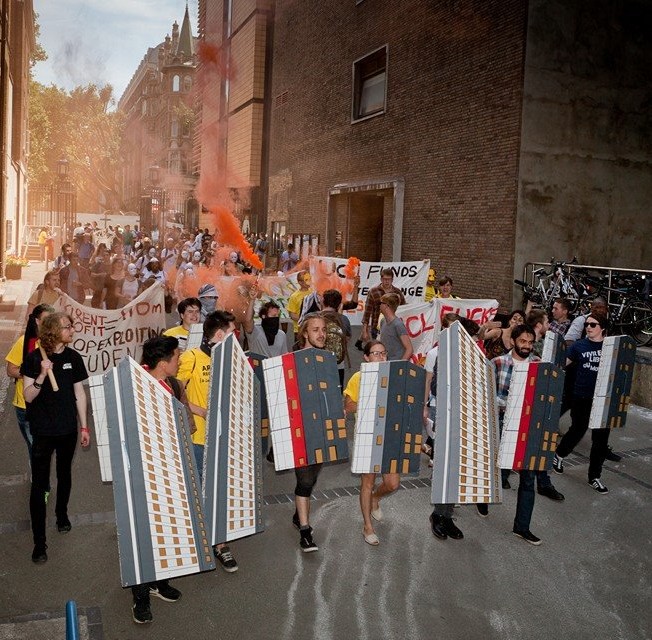4 Reasons the UCL Rent Strike Victory is Important for All Students
by Hope Worsdale and Callum Cant
18 October 2015

A rent strike at UCL has ended with a total student victory. The university is paying £100k in compensation to the strikers, who had to spend a year paying extortionate rent for “unacceptable living conditions”. This amounts to compensation of between £1,368 (double room) and £950 (single room) per person.
Housing is becoming an increasingly focal for the student movement. Here’s why the monumental UCL victory is big news for students everywhere:
1. A national, local focus.
Whereas the national student movement has developed a clear focus on free education, expressed through national demonstrations like the upcoming one on 4 November, local campaigns still vary hugely.
Some are effective, specific and relevant – like the Warwick struggle against TeachHigher or the Sussex fight against the privatisation of facilities and services – but some are less well formulated. This is where housing struggles come in. Potentially, they provide a focal point that students all over the country can pursue in a coordinated way, whilst also having specific local relevance.
Rent strikes and struggles around student housing offer a local issue that can be fought on campus. University managers can’t give us free education, but they can give us affordable rents. Housing also relates to the collective material interests of students in an immediate and obvious way – and pits these material interests directly against the antagonistic material interests of university managers. They are, therefore, a very fertile ground for agitation and collective action.
There is also a very clear potential for crossover with housing campaigns that aren’t run by students, and forming coalitions which break down the student activist bubble. By fighting on common issues, students can escape isolation and link up with wider social movements.
A nationally coordinated wave of housing struggles would have the potential to produce much greater grass roots mobilisation than we have seen in the past.
2. Talking to everyone.
Often free education campus activist groups can turn into groups of mates pursuing daring direct action escapades. Unfortunately, this leaves them isolated from the majority of the student population and unable to call on mass support. As we’ve seen before, the result has often been burnout and repression.
Rent strikes, however, require the long term organisation of broad section of students. It’s impossible to have a clique mentality and pursue the rent strike tactic. The only way a rent strike can win is if it is supported by a majority – thereby forcing activists to care about what everyone thinks. By changing tactical orientation, student activists can push themselves to engage with the student population at large.
3. Beating repressive managers.
Since 2010 the student movement has been repeatedly attacked by aggressive police and neoliberal managers. From the two Birmingham students suspended for a year, students named on court injunctions and CS spray attacks on sit-ins, to the Sussex 5 and the #copsoffcampus protests of 2013, we’ve had our fair share of experience.
But the UCL rent strike is one example where students forced repressive managers to U-turn. Strikers were effectively threatened with expulsion if they didn’t pay due rent, as the university tried to prevent them from re-enrolling for the next year of their courses. However, students stood strong, as David Dahlborn (the Student Union halls rep) explains:
“We knew they were breaking the law from the start, and that’s what we told everybody. But [the threat of expulsion] was still a blow to the campaign.
“Our response involved a lot of face-to-face conversations and quick responses to emails. A lot of people were intimidated by the threats and were forced to break the rent strike but it was a matter of making sure everybody was informed and united rather than atomised so that they could be bullied. We spent a lot of time going door-to-door to see all the residents with updates about their rights and what UCL were doing.”
The lesson is clear: in the face of repression, students have to organise to stay as collectively strong as possible. When we’re isolated, we get crushed.
4. Growing momentum.
Student activists have been predicting a surge of activity and momentum this year. Now it seems those predictions are coming true.
The rent strike victory has emerged whilst another London university, SOAS, is occupied by students demanding that management stop planned course cuts. All this has happened even before the huge national demo on 4 November, which is looking to ignite a new wave of student action and push education issues into the public consciousness.
The longer term calls for a student strike are an indication of where an insurgent student movement could go.
–
Novara Media is trying to raise £10k in just 30 days. To support our mission to create media for a different politics, go to support.novaramedia.com. Help us spread the word using the hashtag #Novara10k!